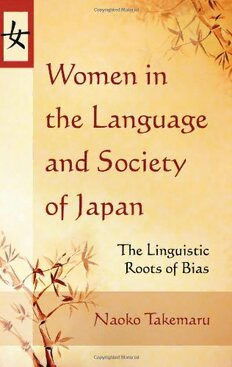
Women in the Language and Society of Japan: The Linguistic Roots of Bias PDF
240 Pages·2010·12.881 MB·
Most books are stored in the elastic cloud where traffic is expensive. For this reason, we have a limit on daily download.
Preview Women in the Language and Society of Japan: The Linguistic Roots of Bias
Description:
Feminist critics have long considered language a primary vehicle for the transmission of sexist values in a culture. This much-needed sociolinguistic critique examines the representation of women in traditional Japanese language and culture. Derogatory and highly-sexualized terms are placed in historical context, and the progress of non-sexist language reform is reviewed. Central to this work are the individual voices of Japanese women who took part in a survey, expressing their candid thoughts and concerns regarding biased gender representations. In their own words, they give voice to the reality of being female within the constraints of a traditional--and sometimes misogynistic--language.
See more
The list of books you might like
Most books are stored in the elastic cloud where traffic is expensive. For this reason, we have a limit on daily download.
